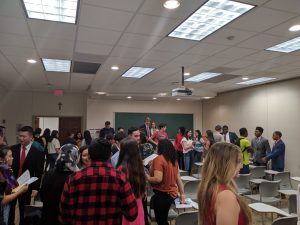Faculty and administration held a listening session on Oct. 21 to discuss the latest Campus Climate Survey on Sexual Assault and Misconduct Report, conducted in February 2019.
The survey had a response rate of 38.9 percent with approximately 6,100 undergraduate and graduate student respondents. Georgetown participated in the survey with 32 other universities as a part of the Association of American Universities (AAU), allowing the administration to compare rates of sexual assault and misconduct on Georgetown’s campus to peer institutions.
The faculty panel included Vice President of Student Affairs Todd Olson; Title IX Coordinator Samantha Berner; Statistical Analyst Ming Li from the Office of Assessment and Decision Support; Vice President of Diversity and Equity Rosemary Kilkenny; Assistant Vice President of Student Health Vincent WinklerPrins; and the Director of Health Education Services Carol Day. A member of Georgetown’s Counseling and Psychiatric Services was also in attendance for anyone who wanted to speak to a confidential counselor.
In the latest survey from Spring 2019, 31.2 percent of respondents reported sexual contact at similar or slightly higher levels in comparison to the first survey, which was conducted in 2016.
“In general, prevalence of unwanted sexual contact, which includes penetration or touching, at Georgetown remained at similar levels when compared to 2016,” Berner said. “But Georgetown’s undergraduate numbers still remain higher than AAU averages.”
Students at the listening session questioned the university’s delay in hiring a Title IX investigator, and lack of information to the student body regarding the selection process of a new investigator. This comes after a long hiring process for the newly filled Title IX coordinator position.
Other students attendees were concerned about lack of university sexual assault training for faculty and students alike. Multiple students said that while Bringing in the Bystander training was a positive step for incoming students, it failed to address sexual assault and misconduct among upperclassmen.
Students criticized the university’s grievance system as the survey revealed survivor’s hesitancy to report assaults.
Representatives from Georgetown Alliance of Graduate Employees (GAGE), a labor union for graduate students employed in university research and teaching, were concerned that 85 percent of graduate female-identifying survivors did not report their assaults to the university, according to the survey.
One student suggested that transparent repercussions were necessary to encourage students to report assault. “We can show people that they will face repercussions for harassment,” she said.
“I think that would allow people to be more comfortable reporting, and also show perpetrators that it’s not acceptable behavior. But there have to be certain repercussions because clearly just talking about it is not enough.”
GAGE representatives also pointed out that 25.7 percent of the survey respondents who reported being victims of sexual assault or misconduct said that the perpetrator was a faculty member or professor. This comes amidst negotiations between GAGE and the university for an improved grievance procedure.
“When we see a number that 1 out of 4 of us it’s from a faculty member or instructor that often means our boss or supervisor or people who have say in whether we get out paychecks,” a student said.
Students within Georgetown’s Title IX Class, taught by Professor Sara Collina within the Women and Gender Studies department, advocated for more student involvement within sexual assault and misconduct advocacy. They acknowledged that students were often burnt out in activism, and suggested Health Education Services offer students payment or course credit to students for internships or activism against sexual assault.
Despite criticism, the administration on the panel was grateful for student feedback.
“We felt it was important to have the voices of the students in our community before we decided to move forward.” Berner said.






